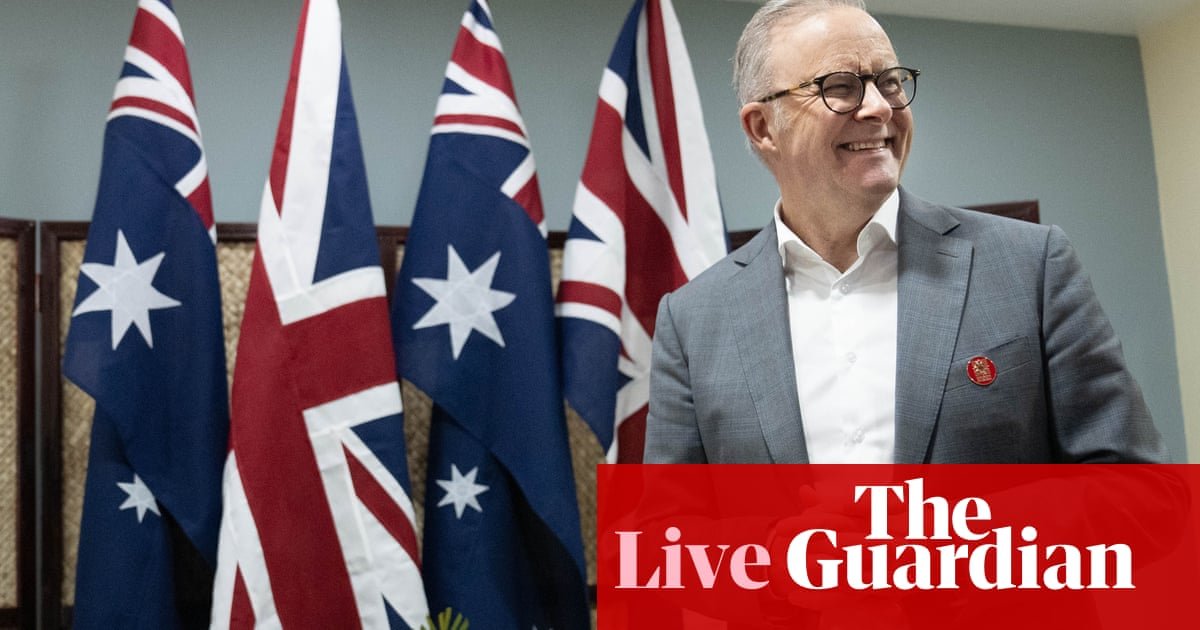
PM says you can’t ‘flick a switch and act immediately’ on climate
Caitlin Cassidy
Anthony Albanese is asked about pressure on his own government at the conference, with suggestions from Pacific leaders that Australia is not doing enough on emissions.
Yesterday, the Tuvalu prime minister released a report blaming Australia, Canada and the United Kingdom for producing 60% Commonwealth nations’ carbon emissions, despite accounting for just 6% of the population.
Albanese says he had “positive discussions” with Pacific leaders.
They recognise that the challenge of climate change doesn’t mean you can flick a switch and act immediately. We need to make sure energy security is prioritised to make sure that we have that support going forward … the feedback from Pacific leaders has been very welcoming of Australia’s leadership in the Pacific with climate action.

Albanese backs strong comments from King Charles that climate change poses an “existential threat”, suggesting he is correct about “the responsibility we have to future generations”.
In most parts of the world, with few exceptions, climate change is above politics. We are seeing the impact of climate change, recognised by scientists around the world. One of the first world leaders to recognise the challenge of climate change and the need to act was Margaret Thatcher.
Key events
Jonathan Barrett WiseTech stock surges after CEO stands down
Technology company WiseTech Global enjoyed a double-digit surge in its share price on Friday after its embattled founder Richard White stood aside, creating a circuit breaker to weeks of damaging news.
Shares jumped almost 20% before retracing to trade at the $113 mark by early afternoon, representing a 14% rise.
WiseTech announced after the market closed yesterday that White would stand down as chief executive “with immediate effect”.
After a short period of leave, White will return in a consulting role for a 10-year term with the title “founder and founding CEO”. His $1m annual pay packet will remain unchanged.
The company has started a search for a new CEO.
White has been under extreme pressure after a dispute with a former lover erupted in the federal court, and multiple women came forward to allege he bought them houses and invested in their businesses in exchange for sex.
The company’s shares were trading at as high as $137 at the start of the month before the revelations spooked shareholders.
RBC Capital Markets analyst Garry Sherriff said in a note today that the leadership transition represented a “positive circuit breaker”.
Emily Wind Many thanks for joining me on today’s blog. Elias Visontay will take you through the rest of our rolling coverage. Take care and enjoy your weekend.
Stolen antique guns found after being made operational
Part of a horde of antique handguns stolen from a community-run museum has been recovered after the weapons were modified to become operational, AAP reports.
Police searched a property in Nowra on the NSW south coast this morning and seized more than a dozen firearms as well as 10,000 rounds of ammunition. They also took custody of a 3D printer and printed firearm parts, $64,700 in cash, 2.3kg of cannabis, and a buggy and two motocross bikes believed to be stolen.
Two men, aged 25 and 29, were arrested and each charged with more than 20 firearms offences. Police believe six of the seized guns were stolen from the Lithgow Small Arms Factory in August. The men were refused bail to appear before Nowra local court today.
Three other men were arrested and charged with the theft in September, when they were accused of stealing 27 commemorative guns from the museum for a profit-driven heist. The weapons included one from the 1700s and a pistol gifted by the Sultan of Oman.
Detectives were told the handguns, worth more than $200,000, could be made operational with modifications. Some of the guns might have been sold to “unwitting” members of the public, police said previously.
People would not face prosecution if they turned in the weapons to a registered firearms dealer or police station, investigators said. The six guns seized in the latest raid had all been made operational, while another eight stolen weapons remain unaccounted for.
Map of areas with severe heatwave warning
As we flagged earlier, there are heatwave warnings in place for parts of the NT, WA and Queensland today. The Bureau of Meteorology has published this video, demonstrating which areas are impacted:
Victoria police provide update on fatal truck crash
Detective Sergeant Stephen Hill addressed the media earlier this afternoon after a truck crashed into a house in regional Victoria and left two dead.
He said the truck went through the front bedroom of the house, which is currently quarantined due to some asbestos issues.
It appears both victims were in the front bedroom at the time. At least one, I believe, was sleeping at the time. The other one doesn’t appear to be.
Hill said a number of vehicles were on the road when this occurred and called triple zero after being “witnesses to the traumatic events that occurred this morning”.
It’s a pretty dead-straight road. There’s no reason for vehicles to swerve, unless they’re overtaking. But how and why and what was going on inside the truck that caused the collision is something we will just have to look at over time.
‘Stay informed’ fire warnings for Queensland communities amid increased danger rating
Earlier we flagged there was a high fire danger rating for large parts of Queensland today. The state’s fire department has issued “stay informed” warnings for three communities:
Mutchilba (near Mareeba) between Algoma Road, Mareeba Dimbulah Road and Springmount Road
Canaga (near Chinchilla) between Southern Boundary Road, Davis Road, Woods Roads, Blowers Road and Pit Road
Dalby between Wilds Road, Warrego Highway, Newtown Stephen Road, Duncans Road and Ritters Road
The department said there is no immediate danger for these communities, but they should say informed “because conditions could change”.
Miles taking questions ahead of tomorrow’s Queensland election
The Queensland premier, Steven Miles, took some questions from reporters on the Gold Coast earlier, ahead of tomorrow’s election. He was asked to respond to today’s Newspoll, showing that Labor was gaining momentum:
I think what we’ve seen is a continuing trend across the polls that, as Queenslanders get more of a chance to see and learn about [LNP leader] David Crisafulli, the more questions they have, the less they like him. That’s what has been borne out here.
If Labor is unsuccessful at the polls this weekend, would Miles stay on as opposition leader? He responded that these are “questions for Sunday and beyond”.
Miles also repeated earlier comments throughout the day that Labor doesn’t intend to do any deals with the Greens and Katters:
The LNP can’t make the same commitment. They have … a preference deal with the Katters already, they have a deal with Pauline Hanson’s One Nation. Imagine how madcap that coalition would be – David Crisafulli, Jarrod Bleijie, Robbie Katter and Pauline Hanson. That’s what they’re proposing.
Elias Visontay Qantas has avoided a spill of its board of directors, after investors voted in favour of its proposed executive pay plan.
A spill resolution would have been put to vote had investors voted down the remuneration plan at today’s annual general meeting in Hobart, after investors delivered a spectacular rejection of the pay deal at last year’s AGM in what was seen as a protest of a series of scandals that led to the early exit of former CEO Alan Joyce.
However, the remuneration report resolution has received overwhelming support. The improved sentiment from shareholders has come amid a more than 60% rise in share price since last year’s AGM.
Despite avoiding the damaging second strike against executive pay, Qantas’ new board chair, John Mullen, faced a series of questions from frustrated investors who felt that the leaders and directors of the company who remain from the tumultuous Joyce era had not sufficiently explained why they allowed certain decisions to be made.
Mullen also defended against a suggestion from an investor that Joyce’s final pay packet – which had already been cut by $9.3m following a review which found considerable harm was done to the Qantas brand under his tenure – should be clawed back even further to just his base salary.
A resolution to allow new CEO Vanessa Hudson to participate in Qantas’ long-term incentive program – which include long-term bonuses on top of base pay for meeting KPIs – was also supported.
Defence Net Zero Strategy released
The Defence Net Zero Strategy has been unveiled, setting out “practical and sensible” ways of reducing the environmental impact and carbon emissions of the government’s largest landholder and energy user, Pat Conroy has said.
As AAP reports, the defence industry minister said this includes using more renewable electricity, changing to lower-emission fuels, increasing energy efficiency, and investigating carbon sequestration on defence land.
The challenges arising from climate change are recognised in the National Defence Strategy and defence is taking action … Action on climate change is part of the defence mission to defend Australia and its national interests.
The defence secretary, Greg Moriarty, said the sector must demonstrate leadership in the transition away from fossil fuels and develop its own energy production capabilities, which would also boost national energy security.
Alternate energy sources that are wholly generated in Australia through sovereign capabilities are highly attractive to defence.
The strategy was described as the “first step” in maintaining capability and interoperability, while contributing to the federal government’s decarbonisation commitments.
But conventional fossil fuels were expected to remain part of the military’s energy mix beyond 2050, albeit at a reduced proportion, it said.
Save the Children Australia welcomes $10m in aid for Lebanon but urges more
Save the Children Australia has welcomed the government’s announcement of a further $10m in humanitarian aid for civilians in Lebanon (see earlier post for more details).
In a statement, its head of humanitarian and global programs Melanie Book said the $10m is a “welcome further step” towards helping a country “already stricken by a severe humanitarian crisis driven by economic collapse and political instability, even before the recent escalation of the conflict”.
Children in Lebanon have felt the crushing anxiety of war for months, and now their worst nightmare has become a reality, with 2,467 people killed, including 127 children, since October last year. 1.2m people, representing 20% of the population, including 420,000 children, have been displaced in recent months.
Save the Children is urging the government to bring its total commitment to $20m in humanitarian relief to Lebanon, “in line with like-minded countries”.
Australia’s response supports an increased international effort for the country, including the pledges made overnight in the International Conference in Support of Lebanon’s People and Sovereignty, convened in Paris.
However, we note with concern that the $1bn pledge goes towards not just humanitarian aid, but also military support. We strongly reiterate the need for an immediate ceasefire to ensure safe humanitarian access, to stop the conflict from escalating further, and prevent further suffering, particularly of children.
Natasha May The government is accelerating the development of a “world first” national targeted skin cancer screening roadmap led by the Australians of the Year, professors Georgina Long and Richard Scolyer.
Using the $10.3m investment announced today, the Melanoma Institute Australia will research risk-based and cost-effective national screening approaches, including improving skin cancer data collection for the Australian Cancer Database in close collaboration with the Australian Institute of Health and Welfare.
In 2028 the Institute will deliver a report to the government with all the evidence about screening and guidance on how Australia might implement a national targeted skin cancer screening program.
The health minister, Mark Butler, said the program would be a “world first,” but its management would be more difficult than other national cancer screening programs:
We want to make sure we’ve got the research and the foundation right, because this is going to be a more tricky program to roll out than the population-wide programs we have, for example, in cervical cancer or in breast and bowel even though there are some age arrangements around that. This will be more targeted. We don’t have a program around the world simply to take off the shelf and import.
Prof Anne Cust from the Melanoma Institute said this would be the “world first high-quality, targeted screening program”.
In Germany they do have some population skin cancer screening, but it’s not actually taken up particularly well at the population level, and it’s not a targeted program.
Long said the way researchers will identify who is high risk will be multi-factorial – age will be only one of many risk factors considered:
Some of the common ones are red hair colour, people with lots of moles on their body, people with a family history, people that have had other types of skin cancer. These are the types of risk factors that we’ll be looking at, also genetic risk factors too.
Josh Butler Health minister not inclined to approve large increases to private health insurance premiums
The health minister, Mark Butler, says he isn’t inclined to approve large increases to private health insurance premiums, indicating the next increase will be “well below CPI” inflation.
Asked at a press conference this morning about whether the government would allow insurers to hike premiums on their customers by large amounts, the minister said it wouldn’t be fair in a cost-of-living crisis. The government approved only a 3% rise this year, after insurers had asked for a much higher raise. Butler said:
Earlier this year, I approved a private health insurance premium increase that was substantially below the going inflation rate. The insurers had asked for premium increases on average of 6% or more.
I ended up approving, after a process of discussion with them and asking them to sharpen their pencil, an increase of slightly more than 3% well below CPI, and certainly well below the increases happening elsewhere in the insurance sector. And I intend to take that approach again over the coming months.
Butler said he was conscious of needing to ensure “a viable private health insurance industry and private hospital sector” – before adding “but I’m also very focused on patients and members on insurance funds to ensure that their cost-of-living is not overly impacted by any increase in insurance premiums over the coming months.”
But the minister did concede that the NSW government’s changes to its health insurance levy could have an impact on people in that state:
It is a matter that is still, as I understand it, going through the NSW parliament. But if that law passes, which probably we expect it will, that will have an impact on the state of NSW, and I think it’s important to bear that in mind.
Josh Taylor Telstra and Optus will begin shutting down their 3G networks on Monday, and are warning customers if they have incompatible devices they may be cut off.
Around 53,000 devices will potentially stop connecting to the networks once the switch-off starts, down from around 740,000 at the start of this year.
Telstra announced yesterday that from 12.01am on Monday it will block all devices that can only call Triple Zero on 3G per a government mandate. Optus began blocking some of these devices last month.
Telstra’s shutdown will begin in Tasmania, with the rest of Australia completed by 4 November.
The two companies have offered tens of thousands of free phones to customers in financial hardship in a bid to get the remaining customers off 3G.
People can SMS 3 to 3498 to check if their device is affected.
Rural health alliance CEO discussing 3G shutdown on Monday
The CEO of the National Rural Health Alliance, Susi Tegen, just spoke with ABC TV about the 3G shutdown on Monday.
Tegen said elderly people in regional areas rely on the 3G and their telephones “for safety and security” with some devices not compatible with 4 or 5G:
[This is] potentially leaving them with their device in a risky situation where they can’t ring triple zero, or if they have alarms or cardio-monitors or oxygen systems which may be impacted … they may have no one else to support them if there is need.
Tegen noted that Telstra had provided low-cost telephones, but isn’t sure what the uptake has been.
In the end, rural, remote and regional Australia deserves the same coverage the people in the city again. Just because they live out of the postcode region, why should they receive less services? We need to ensure there aren’t as many blackspots and the 4G take-up is as high as it can be.
Caitlin Cassidy Body of woman found on property at Gunnedah
In New South Wales, police will address the media this afternoon after a woman’s body was discovered in Gunnedah.
As we reported earlier, police located the body at a property this morning after reports of a concern for welfare. She is yet to be formally identified, however is believed to be aged in her 50s, police said.
A 29-year-old man was arrested at the scene and taken to Gunnedah police station where he is helping police with their inquiries. Police believe the man and woman were known to each other.
Chief inspector Michael Wurth will appear outside Gunnedah police station at 1.30pm – we’ll endeavour to bring you updates here.
Caitlin Cassidy Anthony Albanese is asked about pressure on his own government at the conference, with suggestions from Pacific leaders that Australia is not doing enough on emissions.
Yesterday, the Tuvalu prime minister released a report blaming Australia, Canada and the United Kingdom for producing 60% Commonwealth nations’ carbon emissions, despite accounting for just 6% of the population.
Albanese says he had “positive discussions” with Pacific leaders.
They recognise that the challenge of climate change doesn’t mean you can flick a switch and act immediately. We need to make sure energy security is prioritised to make sure that we have that support going forward … the feedback from Pacific leaders has been very welcoming of Australia’s leadership in the Pacific with climate action.
Albanese backs strong comments from King Charles that climate change poses an “existential threat”, suggesting he is correct about “the responsibility we have to future generations”.
In most parts of the world, with few exceptions, climate change is above politics. We are seeing the impact of climate change, recognised by scientists around the world. One of the first world leaders to recognise the challenge of climate change and the need to act was Margaret Thatcher.


Qantas avoids board spill

Government accelerates ‘world first’ national targeted skin cancer screening


More details on Monday’s 3G network shutdown


PM says you can’t ‘flick a switch and act immediately’ on climate







